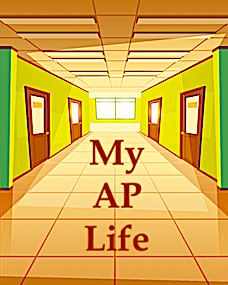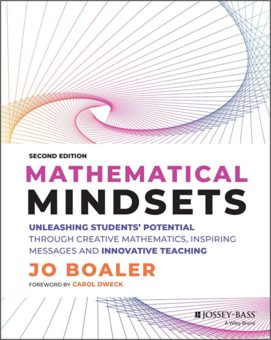Why All Math Students Need Growth Mindsets
A MiddleWeb Blog
 Allow me, for a moment, to take you back to the first day of my 10th grade Geometry class.
Allow me, for a moment, to take you back to the first day of my 10th grade Geometry class.
Desks are in rows facing the front of the classroom with the teacher’s desk at the head of the class (much like the classrooms featured in the old 1980’s high school comedies some of us may be fond of).
The class is a mix of students – there are 9th graders who are taking an advanced math class, 10th graders who have to take this class this year to stay on track, and 11th graders who somehow missed taking the class last year and have to make up the credit.
Before class begins there is conversation, laughter, light teasing – the mood is one of anticipation and hope.

She adds that she has no time to help anyone, so if they find that they are struggling, they should seek help elsewhere. It is up to each student to keep up, and if they cannot, they should pray that they at least make a D to pass.
A pin drop could be heard at this point. She takes one final look around the room, opens her book, and proceeds to teach.
Math beyond My Geometry Classroom
For many of us this was a reality in some of our middle and high school math classrooms (maybe even some elementary classes). It might not have been a geometry class for you (as it was for me) but an Algebra class or Trigonometry class or Foundational Math class where you may have been made to feel like your math skills were subpar because you weren’t in an advanced math class.
In such traditional classes, those that did well in math were exalted and seen as “smart,” “gifted,” or even “geniuses.” Those that struggled or failed were told “math isn’t for everyone,” “some people just are math minded,” or “it’s okay, we didn’t expect you to get this anyway.” Math – the way it is taught and the mindset around it – has always been a sore subject for most people.
A Better Way from Jo Boaler

Boaler sets out to debunk this old way of thinking about math. She uses brain research to prove how ineffective this thinking is, not to mention how devastating it can be to many students and how it runs against the grain of the expanding Growth Mindset movement in education.
From the way that students and teachers view mistakes to the way math has been traditionally taught, Boaler points out examples of the old ways of thinking and new innovative ways that can be used to promote mathematical growth for all students.
Boaler starts Chapter 3 stating, “Mathematics is different from other subjects, not because it is right or wrong, as many people would say, but because it is taught in ways that are not used by other subject teachers….” People, she says, “hold beliefs about mathematics that they do not hold about other subjects.”
It is this long-standing belief that teaching and learning mathematics is somehow unique that promotes a fixed mindset about math. Boaler uses Chapters 1-3 to provide a rich explanation of the true meaning of learning mathematics to include how the brain learns from mistakes and dispelling the myth that math cannot be or is not creative.
The next two chapters explain how to incorporate the foundations of math into a mathematical growth mindset. They include wonderful examples of what Boaler calls “rich mathematical tasks” with a breakdown of how to use “curiosity, connection making, challenge,… creativity, and… collaboration” to create engaging mathematical activities that reach all students allowing them to explore math concepts in a more open way.
Chapters 6-9 help educators learn how to create equity in math, dispelling the myth that only certain groups of people are naturally good at math, and to use a growth mindset strategy to group students, create assessments, and teach students math so that they are successful. Ultimately, students come to see themselves as mathematical people who can learn what they need to learn.
In her book appendices Boaler provides educators with more practical strategies and templates that can be used immediately to start the growth mindset development process.
Theory, Evidence and Practical Tools
Boaler’s book provides the tools that educators need to change their own view of mathematics education as well as their students’ idea of what it means to learn math.
She provides evidence to support her theories on why we must change our mindsets about math. She also offers practical instructional strategies that can be used now to create math classrooms where all students are encouraged and engaged in mathematical practices designed to enrich their lives.
Mathematical Mindsets is a great guide for math teachers, math coaches, and administrators who want to be the catalyst for change in their schools. We’re using it in our school to do just that. As Boaler says:
“If we give students this rich, creative, growth mathematics experience, then we change them as people and the ways they interact with the world.”
Imagine how different my 10th grade geometry classroom would have been if my teacher had had this type of mindset.
DeAnna Miller first encountered math students when she taught pre-Algebra at an alternative school during her novice year. Her understanding deepened when she became an instructional coach and worked with middle school math teachers. Now, as an AP, she works hand in hand with her K-6 school’s math coach, and she’s doing her dissertation on the role of math coaches in student achievement.



































Thank you, DeAnna Miller, for your important work. Many of my retired humanities-teaching colleagues love learning but still can’t understand why they were never “good” at math. I love your idea of linking math with story!